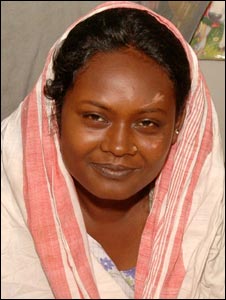
Nearly after 16 months later, Laxmi Oraon, a tribal woman from Assam’s Sonitpur district, who was stripped and assaulted in Guwahati has been offered a ticket by Assam United Democratic Front (AUDF), a regional party, to contest the Tezpur parliamentary constituency. She was stripped by angry locals in Dispur last gate when the All Assam Addivasi Students’ Association protest a rally in November 2007 demanding ST status and equal treatment in Assam.
Ms Oraon had joined the rally in November 2007 along with thousands of Adivasi people, who mostly work as labourers in Assam’s 800 tea gardens. The rally turned violent and the Adivasis started vandalising shops and beating up policemen and locals before they were overwhelmed by a huge number of local people. She was stripped and beaten before an Assamese man took off his T-shirt, covered her and dragged her to safety. The AUDF is a Muslim-dominated party, has 10 MLAs in Assam State Legislative Assembly.
The present day population of the tea labour community in the state is estimated to be 20 percent of the state’s population, which according to conservative estimate comes to five million. The Adivasis tribals, who mostly leave in tea gardens of Assam, face multiple deprivations which have their root in the historic exclusion and denial of tribal status to the community. Their demand for ST status has to be analysed in the context of the indigenous tribes like – Boro, Rabha, Mission, and other various groups who have been deprived of political, social and economic opportunities even after India’s independence in 1947. These indigenous have been demanding for autonomy within the state of Assam in the last few decades. The recent demand by Adivasis for ST status contradicts to the demands of the indigenous people who are opposed to their demand.
The Adivasis tribals were brought from central Indian states by the British rulers to work in Assam’s tea estates soon after the discovery of tea leaves in 1820. The tea labour communities were recruited by the British Tea Planters from present day Jharkhand, Chhattisgarh, Bihar, Andhra Pradesh, Orissa, Uttar Pradesh and West Bengal between 1861 until the early 20th century, to work as indentured labour in tea plantations in Assam, spread over the districts of Western Assam, Morigaon, Nagaon, Sonitpur and Darrang in Middle Assam, Golaghat, Jorhat, Sibsagar, Dibrugarh and Tinsukhia in Eastern or Upper Assam, North Cachar and Karbi Anglong districts in Southern Assam and the Barak Valley. Belonging to the tribal groups such as Santhals, Mundas, Oraons, Kharias, Gonds, Khonds, Kisang and Nagesias, they settled down in Assam at the end of the contract period, and some left the tea plantations to settle in the surrounding agricultural lands before the expiration of the contract. The latter came to be known as the ex-Tea labour community which lives in villages neighbouring the tea estate and provide casual labour to it depending on seasonal demand.



